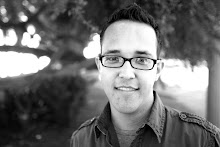
Although I haven't written about it much in the last few months, agnosticism seems to be almost constantly on my mind. I've been doing some thinking lately, trying to figure out why it is such an important concept to me, so I decided that I should reiterate (for my own benefit as much as yours) what I mean by agnosticism. When I usethe word agnostic here on this blog, I'm not trying to call to mind all of the negative, apathetic, anti-religious, and sometimes nihilistic connotations that burden the term. I'm not making any broadly sweeping claims about religion, God, or the universe. By agnostic I simply mean a three word phrase, uttered out of conscious humility—I don't know.
For me, agnosticism is not the end of faith. Agnosticism isn't a box that I check on surveys instead of a religion. It isn't a term I toss around glibbly at 2 am in hip coffee shops, trying to show people that I'm enlightened. It isn't something that can ever be an identity. There are lots of things that agnosticism is not—but most importantly agnosticism is not the end.
Agnosticism is a beginning.
Imagine this situation: You invite me over tomorrow evening, we plop down on your couch, and you open up a bottle of cheap red wine, ready to enjoy a long night of lively conversation. After the ordinary what-have-you-been-up-to-latelys and how's-life-been-treating-yous, you jump right in, asking my opinion on some of life's big questions: Why are we here? What is the purpose of life? How can we know the truth? Is there a God?
Assuming I haven't had too much wine, all of my answers will begin with the same three words: I don't know. I begin my answers that way because it is the truth. I am a human being, embodying plenty of possibilities and perils, but as limited as a shrink-wrapped potato. No matter how much I am able to do or how much I fail, I am bound to this one body and this one mind. Because I am a limited, fallible, finite human being, all of my answers have to begin with that three-word admission of humility.
But agnosticism is not an end. It cannot be an end. If I want to live and love and breathe, I have to find meaning. I have to try. After all, just because I don't know with certainty doesn't mean I can't make a good guess.
That is what agnostic theology is all about. It starts with the humble admission I don't know, but it presses on from there. None of us know, but we can't stop at that. The world would be a large, mushy lump of nothingness if we let agnosticism be the end. Just because we are limited human beings does not mean we don't experience longing and yearning for something greater.
For millenia, humans have reached toward the heavens for answers, and agnosticism does not give impetus to stop. Agnosticism has to be the beginning—a vocalization of our humanness which gets that truth out in the open—from which we then search and work and build.
When I write about agnosticism, I don't mean anything negative. I mean something realistic. When it comes to God and meaning and the universe, the fact of the matter is that I don't know....
But that's a beginning, not an end.


Thank you, Matt. Very, very well put. What you iterated speaks deeply into my heart of hearts and reinforces the longing I have in pursuing that which seems most sensible and beneficial to my mind and heart.
ReplyDeleteSomehow, in the end, I truly suspect, and count on, the idea that for those who possess a humble agnosticism concerning ultimate things, God has a special place in his heart in reserve. It is very difficult being in many-a-Christian-context where everything has been figured out for us. The last thing I desire to do is to cause someone to trip-up in their faith journey, and yet at the same time I must remain faithful to what I really believe at a given time (always maintaining an openness toward receiving further light).
I think that I prefer the way of humble agnosticism as I am more predisposed toward engaging others at meaningful levels that involve all of life, not just the cognitive realm.
Perhaps our "knowing" should be approached more from a broader context in light of what it means in being a human-being within the realm of actual lived-out experience.
An appreciation both for the subjective an objective elements of knowing might be in order, while seeking an appreciation for others' searches for that which seems to elude us all much of the time.